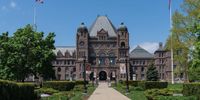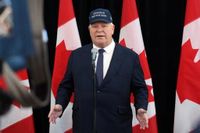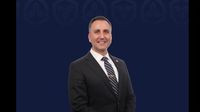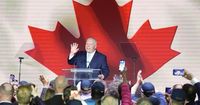Ontario Premier Doug Ford has unveiled a new cabinet, making significant changes to key ministries while maintaining many familiar faces in prominent roles. In a ceremony held on March 19, 2025, at the Royal Ontario Museum, Ford's cabinet reshuffle comes on the heels of his Progressive Conservative party's resounding victory in the recent snap election, which was heavily influenced by U.S. trade relations and tariffs instigated by President Donald Trump.
Among the noteworthy changes, Paul Calandra has transitioned from his role as Minister of Municipal Affairs and Housing to take over the key position of Education Minister, succeeding Jill Dunlop, who has moved to lead the Ministry of Emergency Preparedness and Response. Rob Flack, who previously served as the agriculture minister, has been appointed as the new Minister of Housing, a role of critical importance as Ontario continues to grapple with housing shortages and targets for new home construction.
Meanwhile, Trevor Jones has stepped into the role of Minister of Agriculture, Food, and Agribusiness, following Flack’s departure from the portfolio. Todd McCarthy shifts from being the Minister of Public and Business Service Delivery to taking over the Environment, Conservation and Parks portfolio, highlighting Ford's commitment to addressing environmental challenges in the province.
The Ontario legislature, which is set to resume on April 14, 2025, has a cabinet that remains largely the same in size. This continuity is deliberate, according to Finance Minister Peter Bethlenfalvy, who remarked on the importance of stability amid perceived threats from southern neighbors. “I think the message of stability and certainty in this environment is something we bring to the table,” he explained shortly after the cabinet was sworn in.
Ford’s cabinet announcement is seen as an attempt to project leadership against the backdrop of U.S. trade policies that have raised alarm in Canadian markets. Addressing the assembled crowd, Ford noted the challenges posed by tariffs and the need for Ontario to bolster its infrastructure and economic resilience. “We will rise to the occasion because this is the greatest province in the greatest country on earth,” he asserted, emphasizing the importance of harnessing Ontario’s resources and potential.
As part of his speech, Ford quoted former U.S. President Ronald Reagan, urging caution against demagogues advocating for trade wars that could weaken overall security. “Canada will not be the 51st state,” he stated, affirming Canada's sovereignty amidst growing tensions. His remarks concluded with a call for collaboration in facing these economic challenges, earning him a standing ovation from the audience.
The cabinet reshuffle has elicited mixed reactions across the political spectrum. The New Democratic Party (NDP) leader, Marit Stiles, criticized the cabinet as “more of the same” and voiced concerns over the retention of ministers perceived to have failed in their previous roles. “This cabinet includes the same Minister of Transportation who couldn’t open a transit line, and the same Minister of Health who downplayed the doctor shortage,” she stated in a post-announcement statement.
Likewise, federal Transport Minister Chrystia Freeland, who recently met with Ford, indicated her continued interest in interprovincial trade, a vital issue for Ontario’s economic future. “For Prime Minister Carney, interprovincial trade is a huge priority,” she remarked, signaling that cooperation at various government levels would be essential moving forward.
Calandra’s new role as Education Minister has brought swift praise from the Elementary Teachers’ Federation of Ontario (ETFO), who expressed eagerness to collaborate on addressing significant issues within the public education system. “ETFO welcomes Paul Calandra as Ontario’s new Minister of Education,” they stated in a release, highlighting the ongoing challenges facing education, such as class sizes and support for students.
Ford's previous cabinet, which reached a total of 37 ministers, had seen significant expansions since his election in 2018, and that trend continued albeit with some shifts in responsibilities. Notably, Graham McGregor has taken on the Minister of Citizenship and Multiculturalism, a role previously held by Michael Ford, the premier's nephew, who did not seek re-election in the recent election.
Amidst these political maneuverings, Ontario’s economic landscape remains a pressing concern for the cabinet, particularly with the looming uncertainties posed by international trade tensions. As Premier Ford strives to navigate these headwinds, his administration's ability to respond effectively may define its legacy.
Moving forward, the Ontario government faces significant challenges. With public expectations for effective governance heightened due to recent missteps and ongoing economic pressures, the new cabinet will need to hit the ground running to restore public confidence and enhance Ontario's competitive standing.
As the drama of politics unfolds in the province, it remains critical for the Ford administration to prioritize pressing issues while addressing the growing voices of dissent within the legislative assembly and beyond. The upcoming session promises to be pivotal in determining how effectively Ford can implement his vision for Ontario amid a complex backdrop of domestic and international relations.








